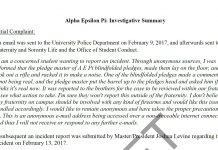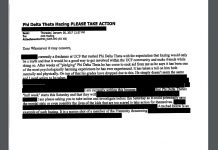UPDATE:UCF’s attorney responded to KnightNews.com this afternoon with their stance as to why the meeting was justifiably closed. We are working to review their response and will have more details later on.
Alpha Tau Omega’s formal panel hearing held Tuesday morning could spark a lawsuit resulting in a judge dismissing the verdict for having denied the public access.
KnightNews.com attempted to enter the hearing at the Office of Student Conduct, however, was denied access upon claims that it was private and not accessible to the public. UCF has yet to immediately respond to our requests for legal justification that would allow the closing of this hearing to the public and therefore, the media.
An opinion by the Florida Attorney General regarding a school board case in a similar situation states that FERPA, a Federal law that protects the privacy of student education records, cannot close a meeting on the basis of the discussion of student records. Based on Florida’s Sunshine Law and this opinion, it appears any meeting by two or more by public school officials regarding the future of an organization should be open to the public — even if they’re discussing confidential student records.
Essentially, if UCF has no legal justification to deny the public entry to this hearing, it could result in a lawsuit filed by any member of the public or media wanting to observe the hearing to ensure fairness and justice was carried out. If a judge rules a violation to the Sunshine Law has occurred, it can result in the verdict of the hearing being declared invalid, according to the Florida Bar’s Reporter Handbook.
Another issue being faced is the records being held by David Stollman, the anti-hazing speaker who the accuser contacted regarding the hazing allegations made against ATO. We recently spoke to attorney Barbara Petersen, the President of the First Amendment Foundation in Tallahassee, Florida, who believes that Stollman was acting as an agent of UCF and, therefore, the contact between himself and the accuser are public record.
Under Florida’s public records law, it states that the public record law will apply to “any . . . private agency, person, partnership, corporation, or business entity acting on behalf of any public agency.” [s. 119.011(2), F.S.]
“Thus, because Stollman has injected himself into the university’s complaint process and is accepting student complaints on behalf or instead of UCF, then Stollman is subject to the PRL,” Petersen told us. “As you say, he has stepped into the shoes of UCF and acted on its behalf. This is bolstered by the fact, I believe, that UCF has taken action based on Stollman’s email summarizing the original complaint.”
While Stollman believes that he does not have a legal obligation to provide the records to the school and the public, a judge may have a different answer, as he was unable to provide any legal justification to refute the legal analysis saying he is covered by the public record law.
KnightNews.com will continue to investigate these matters and let you know if UCF comes up for legal justification with its questionable actions. We will also update this hearing’s verdict when it is released.






